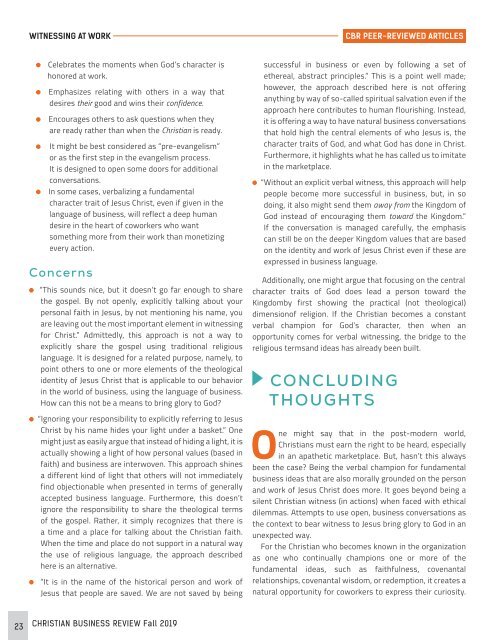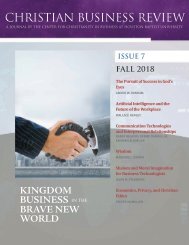Christian Business Review 2019: Workplace Practices That Glorify God (Issue 8)
Create successful ePaper yourself
Turn your PDF publications into a flip-book with our unique Google optimized e-Paper software.
WITNESSING AT WORK<br />
CBR PEER-REVIEWED ARTICLES<br />
Celebrates the moments when <strong>God</strong>’s character is<br />
honored at work.<br />
Emphasizes relating with others in a way that<br />
desires their good and wins their confidence.<br />
Encourages others to ask questions when they<br />
are ready rather than when the <strong>Christian</strong> is ready.<br />
It might be best considered as “pre-evangelism”<br />
or as the first step in the evangelism process.<br />
It is designed to open some doors for additional<br />
conversations.<br />
In some cases, verbalizing a fundamental<br />
character trait of Jesus Christ, even if given in the<br />
language of business, will reflect a deep human<br />
desire in the heart of coworkers who want<br />
something more from their work than monetizing<br />
every action.<br />
Concerns<br />
“This sounds nice, but it doesn’t go far enough to share<br />
the gospel. By not openly, explicitly talking about your<br />
personal faith in Jesus, by not mentioning his name, you<br />
are leaving out the most important element in witnessing<br />
for Christ.” Admittedly, this approach is not a way to<br />
explicitly share the gospel using traditional religious<br />
language. It is designed for a related purpose, namely, to<br />
point others to one or more elements of the theological<br />
identity of Jesus Christ that is applicable to our behavior<br />
in the world of business, using the language of business.<br />
How can this not be a means to bring glory to <strong>God</strong>?<br />
“Ignoring your responsibility to explicitly referring to Jesus<br />
Christ by his name hides your light under a basket.” One<br />
might just as easily argue that instead of hiding a light, it is<br />
actually showing a light of how personal values (based in<br />
faith) and business are interwoven. This approach shines<br />
a different kind of light that others will not immediately<br />
find objectionable when presented in terms of generally<br />
accepted business language. Furthermore, this doesn’t<br />
ignore the responsibility to share the theological terms<br />
of the gospel. Rather, it simply recognizes that there is<br />
a time and a place for talking about the <strong>Christian</strong> faith.<br />
When the time and place do not support in a natural way<br />
the use of religious language, the approach described<br />
here is an alternative.<br />
“It is in the name of the historical person and work of<br />
Jesus that people are saved. We are not saved by being<br />
successful in business or even by following a set of<br />
ethereal, abstract principles.” This is a point well made;<br />
however, the approach described here is not offering<br />
anything by way of so-called spiritual salvation even if the<br />
approach here contributes to human flourishing. Instead,<br />
it is offering a way to have natural business conversations<br />
that hold high the central elements of who Jesus is, the<br />
character traits of <strong>God</strong>, and what <strong>God</strong> has done in Christ.<br />
Furthermore, it highlights what he has called us to imitate<br />
in the marketplace.<br />
“Without an explicit verbal witness, this approach will help<br />
people become more successful in business, but, in so<br />
doing, it also might send them away from the Kingdom of<br />
<strong>God</strong> instead of encouraging them toward the Kingdom.”<br />
If the conversation is managed carefully, the emphasis<br />
can still be on the deeper Kingdom values that are based<br />
on the identity and work of Jesus Christ even if these are<br />
expressed in business language.<br />
Additionally, one might argue that focusing on the central<br />
character traits of <strong>God</strong> does lead a person toward the<br />
Kingdomby first showing the practical (not theological)<br />
dimensionof religion. If the <strong>Christian</strong> becomes a constant<br />
verbal champion for <strong>God</strong>’s character, then when an<br />
opportunity comes for verbal witnessing, the bridge to the<br />
religious termsand ideas has already been built.<br />
CONCLUDING<br />
THOUGHTS<br />
One might say that in the post-modern world,<br />
<strong>Christian</strong>s must earn the right to be heard, especially<br />
in an apathetic marketplace. But, hasn’t this always<br />
been the case? Being the verbal champion for fundamental<br />
business ideas that are also morally grounded on the person<br />
and work of Jesus Christ does more. It goes beyond being a<br />
silent <strong>Christian</strong> witness (in actions) when faced with ethical<br />
dilemmas. Attempts to use open, business conversations as<br />
the context to bear witness to Jesus bring glory to <strong>God</strong> in an<br />
unexpected way.<br />
For the <strong>Christian</strong> who becomes known in the organization<br />
as one who continually champions one or more of the<br />
fundamental ideas, such as faithfulness, covenantal<br />
relationships, covenantal wisdom, or redemption, it creates a<br />
natural opportunity for coworkers to express their curiosity.<br />
23<br />
CHRISTIAN BUSINESS REVIEW Fall <strong>2019</strong>














